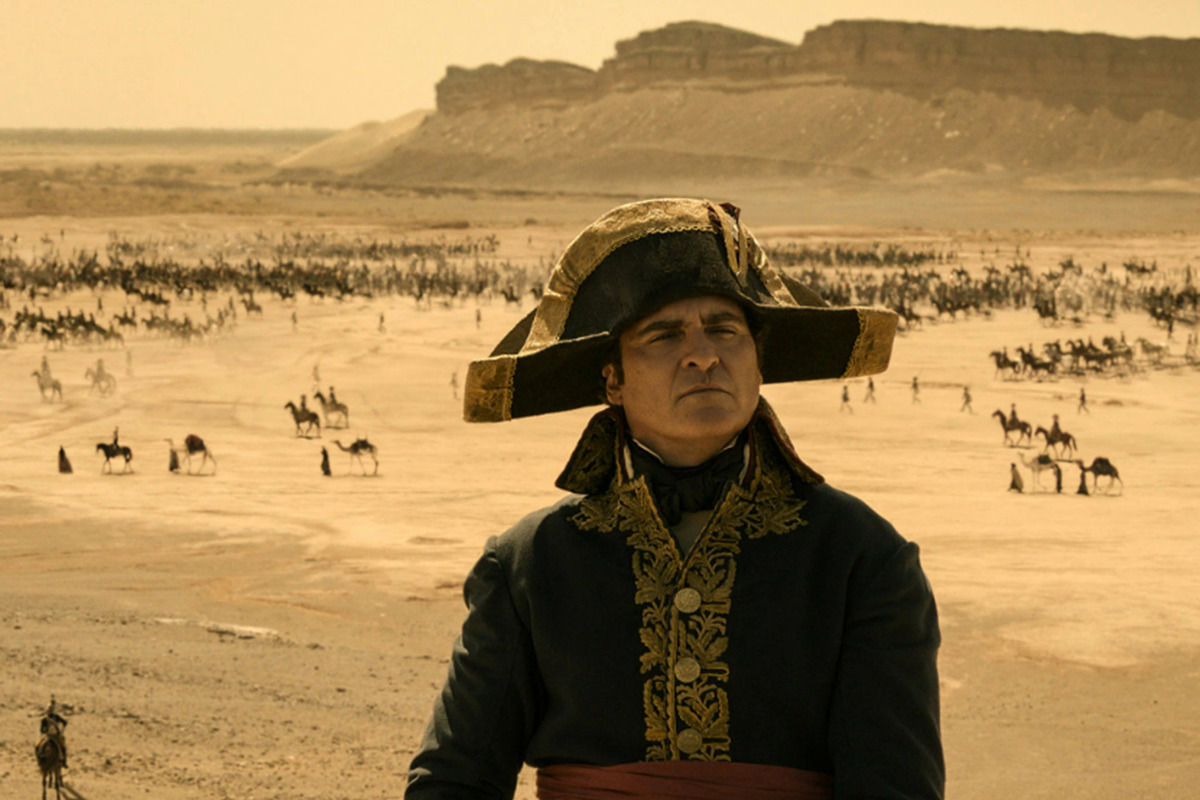Historians have rehabilitated Napoleon: he did not shoot Egyptian pyramids with cannons
[ad_1]

Against the backdrop of the appearance of the trailer for Ridley Scott’s new film “Napoleon,” Western media are widely discussing not only the cinematic merits of the expected blockbuster, but also the role of the conquering French emperor in history. In particular, the film provoked controversy about whether Bonaparte fired cannons at the Egyptian pyramids.
Scenes from the “Napoleon” trailers cause a storm of emotions, notes The New York Times. This is especially true for the sensational depiction of French troops, led by Joaquin Phoenix as the emperor, firing cannons at the Pyramids of Giza.
“I don’t know if he did it,” Ridley Scott told the Times of London. “But it was a quick way of saying he took over Egypt.”
There is no evidence that French invaders bombarded the pyramids with artillery or that Napoleon’s troops shot off the nose of the Sphinx, another popular apocrypha (evidence suggests the nose was broken off centuries before Napoleon’s reign), The New York Times reports.
“From what we know, Napoleon valued the Sphinx and the pyramids highly and used them as a means of encouraging his troops to greater glory,” says Salima Ikram, professor of Egyptology at the American University in Cairo. “He definitely didn’t shoot them.”
Some historians have criticized Ridley Scott, but many hope “Napoleon” will spark interest in the events that inspired the film. Although Napoleon did not literally shoot at the pyramids, his invasion of Egypt had a profound impact on Egypt’s cultural heritage and how the world understands it today.
“Ultimately, the campaign ended in defeat—the French lost and were driven out,” says Alexander Mikaberidze, a professor at Louisiana State University in Shreveport who specializes in Napoleon history. But Napoleon’s invasion also led to a complex scientific and cultural legacy, he added: “The beginning of Egyptology, the beginning of this fascination with Egypt and the desire to explore Egyptian history and Egyptian culture.”
The French campaign in Egypt from 1798 to 1801 was dictated by Napoleon’s colonial ambitions and the desire to undermine British influence. But in addition to creating an army of about 50,000 men, Napoleon made the unusual decision to invite more than 160 scientists – in fields such as botany, geology, the humanities and others – to accompany the invasion.
Scholars documented Egypt’s cultural and natural landscapes, which were eventually compiled into a seminal 1809 publication containing details of the Giza pyramid complex. This is one of the reasons why historians know that Napoleon visited the pyramids, as shown in Ridlem Scott’s film, although it is unlikely that he considered these structures as military purposes.
“There was a real interest on the part of scientists and, I think more broadly, a real interest on the part of Napoleon in being able to understand these things that Europeans hadn’t really had easy access to since the classical period,” notes Andrew Bednarski, a visiting scholar from American University in Cairo, which specializes in Egyptology and 19th-century history.
In their efforts to document Egypt’s vast archaeological heritage, French scientists have recovered many important artifacts, including the Rosetta Stone, a rock with inscriptions in three languages that was instrumental in deciphering ancient Egyptian hieroglyphs. The stone and many other trophies ended up in British hands after French power in Egypt collapsed in 1801. By then Napoleon had returned to France.
After the campaign failed, rumors of Egypt’s cultural wonders spread throughout Europe and sparked a new wave of global Egyptomania. This insatiable appetite for Egyptian antiquities led to centuries of exploration, excavation, and exploitation of the region’s vast material culture. Since Napoleon’s invasion, prospectors and traders have removed countless artifacts from Egypt, many through clandestine and outright criminal channels.
As a result, many of Egypt’s greatest treasures, including the Rosetta Stone and a bust of Nefertiti, reside in museums and private collections far from home. The Egyptian antiquities community has worked for years to repatriate as many artifacts as possible, with some success, as well as developing new strategies to protect its cultural heritage within national borders.
“There are more plans to manage the sites, increase the number of museums and increase media coverage of antiquities, which is aimed not only at attracting tourists, but also at instilling national pride and educating the wider Egyptian public about the significance of their heritage,” emphasizes Dr Ikram.
Egypt has also faced renewed looting in recent years as a result of internal instability. The US-based non-profit Antiquities Coalition estimates that approximately $3 billion worth of relics have been smuggled out of Egypt since the revolutionary events of the Arab Spring in 2011. The Institute of Egypt, a research center that Napoleon founded in Cairo during his invasion, burned to the ground in 2011 during the unrest of the Arab Spring. Destructive forces such as pollution and the effects of climate change, including extreme weather conditions, pose further threats to Egypt’s monuments and artifacts.
Napoleon’s ill-fated campaign created a modern demand for Egyptian antiquities that continues to this day. Ridlem Scott’s vision of Napoleon firing cannons at the Pyramids of Giza is just a continuation of this long-standing desire to use Egyptian symbols and sell them to new audiences. Many experts condemned the inaccuracies in the film, which caused an obscene reaction from director Scott. But some see “Napoleon” as an opportunity to reconsider the polarizing French emperor’s lasting impact on the world.
“Anything that can spark people’s interest in the history of Egyptology, the effects of colonialism around the world, the Enlightenment—any of those things, I think, is a positive thing,” Dr. Bednarski states.
[ad_2]
Source link








